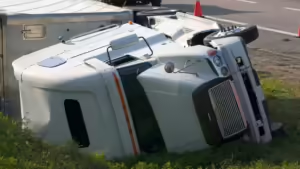What to Do After a Truck Accident: A Step-by-Step Guide


Truck accidents can be serious, traumatic and complicated. Only trust experienced truck accident attorneys like those at Abeyta Nelson Injury Law to handle your case.
Truck accidents are among the most dangerous collisions on Washington roads. The sheer size and weight of commercial trucks mean that even a seemingly minor crash can cause catastrophic injuries or fatalities. If you’ve been involved in a truck accident, the moments that follow are critical, for your health, your legal rights, and your financial future.
This step-by-step guide will help you understand exactly what to do after a truck accident in Washington State.
Step 1: Prioritize Your Safety
Your immediate safety comes first. If you’re able to move:
- Pull your vehicle to the side of the road, away from traffic.
- Turn on your hazard lights.
- If you’re trapped or seriously injured, wait for emergency responders.
If you’re a bystander or able-bodied passenger, check on others but never attempt to move an injured person unless there’s an imminent danger (like fire).
Step 2: Call 911
Always report a truck accident to law enforcement. This is not optional. Washington law requires reporting any crash that results in injury, death, or property damage exceeding $1,000 (RCW 46.52.030). Police will:
- Secure the scene.
- Take statements.
- File a collision report (which becomes crucial later).
Make sure to get the report number and the officer’s name and badge number.
Step 3: Seek Immediate Medical Attention
Even if you feel fine, get checked out. Truck accidents often result in:
- Whiplash
- Internal bleeding
- Spinal injuries
- Concussions or TBIs
Some injuries don’t present symptoms until hours, or days, after the crash. A prompt medical evaluation creates documentation that links your injuries directly to the crash.
Step 4: Document the Scene (If Safe)
If you’re physically able and it’s safe:
- Take photos of:
- All vehicles involved (damage, license plates)
- Skid marks
- Road signs or signals
- Weather and lighting conditions
- Get video if you can.
- Collect witness names and phone numbers.
- Ask the truck driver for:
- Name, phone number, license number
- Insurance details
- Employer name
- U.S. DOT number from the truck cab
Step 5: Be Mindful of What You Say
Avoid admitting fault, even casually. Statements like “I didn’t see you” or “I’m sorry” can be used against you. Stick to the facts when talking to police and never speculate.
If the truck driver is aggressive or confrontational, don’t engage. Let police handle the interaction.
Step 6: Notify Your Insurance Company
Report the accident to your insurer as soon as you can, but be brief:
- Share that a crash occurred.
- Confirm the other party was a commercial vehicle.
- Do not give a recorded statement or accept any settlement before speaking to a personal injury attorney.
Step 7: Contact a Truck Accident Attorney
Truck accidents are not like typical car crashes. Why?
- Multiple parties may be liable, driver, employer, cargo company, maintenance team, or truck manufacturer.
- Trucking companies are often backed by aggressive legal teams and insurers.
- Federal and state regulations (FMCSA) come into play.
Our truck accident lawyers secured some of the largest settlements in Central Washington history, including $6.25 million for a car-truck collision and $4.264 million for a client paralyzed in a multi-vehicle pileup on icy I-90. We know how to investigate commercial trucking cases and hold all responsible parties accountable.
Step 8: Preserve Evidence
Time-sensitive evidence in truck accidents can include:
- Dashcam footage
- Truck “black box” (ECM) data
- Driver logs (to see if hours-of-service rules were violated)
- Maintenance records
- Drug/alcohol test results
- Dispatch records
Your attorney can send a spoliation letter immediately to prevent destruction of critical evidence.
Step 9: Keep Track of All Medical Bills & Expenses
Document everything:
- ER visits
- Surgery and specialist reports
- Medications
- Physical therapy
- Transportation to appointments
- Missed workdays or lost wages
If you file a personal injury claim, all these will be used to determine the value of your damages.
Step 10: Don’t Accept Quick Settlements
Trucking insurance companies may try to contact you quickly with a settlement offer. These offers are almost always far less than what your case is worth, especially if future medical care or loss of income is involved.
Talk to your attorney before signing anything.
Common Injuries in Truck Accidents
Due to the force of impact, these are some of the most common injuries we see in Washington truck accident cases:
- Spinal cord injuries and paralysis
- Traumatic brain injuries (TBIs)
- Multiple fractures
- Internal organ damage
- Burns or disfigurement
Recovery can take months or years, and in many cases, victims face lifelong consequences.
Why Trucking Companies Fight Hard
Trucking companies and their insurers often go to great lengths to avoid responsibility. They may:
- Claim you were at fault
- Deny the driver was “on the clock”
- Dispute the extent of your injuries
- Delay, delay, delay
This is why having an experienced legal team on your side matters. Our team builds strong cases based on hard evidence and expert testimony, and we don’t back down.
Hiring a Truck Accident Lawyer in Yakima
The aftermath of a truck accident is overwhelming, physically, emotionally, and financially. But you don’t have to navigate it alone. Let an experienced personal injury attorney protect your rights and fight for the compensation you deserve.
At Abeyta Nelson Injury Law, we offer free case evaluations and serve clients across Yakima, Ellensburg, and Sunnyside. If you or a loved one has been injured in a truck accident, call us today at 509-575-1588 to schedule a consultation.
Your road to recovery starts with the right legal partner by your side.